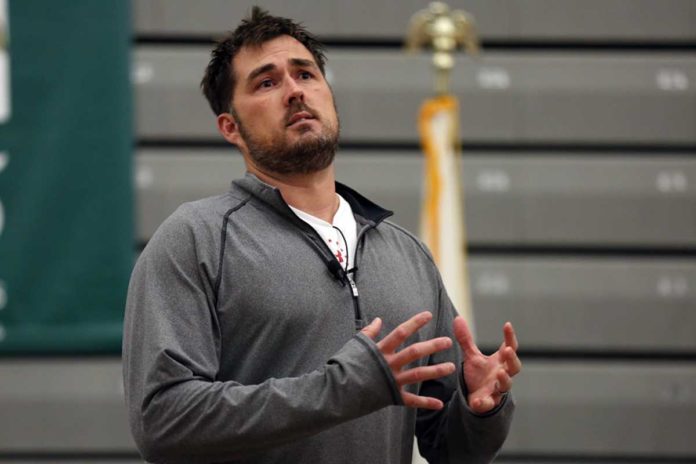Retired Navy SEAL and author of the book “Lone Survivor: The Eyewitness Account of Operation Redwing and the Lost Heroes of SEAL Team 10,” Marcus Luttrell discussed his military experience, fallen comrades and Operation Redwing when he came to Slippery Rock University Wednesday.
The event had to be moved from the ballroom, which only fits 750 people, and into Morrow Field House to accommodate the 1,600 people who attended. Veterans and those currently serving in the military were invited to meet Luttrell before the show started at 8 p.m., and were offered the first three rows of seating.
Luttrell grew up in Texas with his parents and his twin brother, Morgan Luttrell. When he was 14, his brother came to him and told him that they were going to be Navy SEALS. From there, the pair went to be trained by Army veteran, Billy Shelton, who trained people to be in the Special Forces. Luttrell said that he and his brother showed up every day at 4:30 to train with Shelton from the time they were 15 to the time they went to qualify to be Navy SEALS.
“The beauty of growing up is that you get to find out what you are,” Luttrell said. “I was born to be a gunfighter.”
Both brothers successfully completed their training and became Navy SEALs. In 2005, Marcus Luttrell was sent on Operation Redwings with three other SEALs to locate and kill Ahmad Shah, a Taliban leader.
The three other SEALs were sniper Matthew “Axe” Axelson, who Luttrell described as “the smartest man he ever knew,” Danny Dietz, who operated the radio, and officer in charge, and Luttrell’s best friend, Mike Murphy.
While holding their position on a mountain, Luttrell said that goat herders came up and compromised their position. Unlike in the movie, the herders arrived before their goats did, and because the goats would continue on to the village below even if the team killed the herders, the village would come looking for them and compromise their mission further.
They let the herders go down to the village, and retreated further up into the mountain, hoping to get a radio signal. By the time they got up there, there were over 50 men surrounding them with RPGs and AK-47s, and they attacked the team.
During the three hour-long battle, Luttrell was carrying the wounded Dietz when Dietz was shot in the head, killing him instantly. Axelson was shot in the head, but continued moving for three miles before he died. Murphy kept climbing the mountain under fire in order to call in for help, an act that later won him the Medal of Honor.
“I knew we were going to die in that battle,” Luttrell said.
When he was dying, Murphy was calling for Luttrell’s help, and Luttrell said he couldn’t listen to him die. He put down his weapon, and covered his ears with both hands, which he said made him a coward.
“Every man has a breaking point,” Luttrell said. “I never thought I’d find mine.”
Luttrell said that to this day he regrets not telling his comrades that he loved them, and he said he’d never make that mistake again.
On his fall down the mountain, Luttrell bit off his tongue and swallowed it, broke his back, and suffered severe head trauma. Despite these injuries and multiple gunshot wounds, he crawled seven miles in search of water, and when he found it, he also found Mohammed Gulab, who took him to his village and sheltered him for five days despite threats from the Taliban.
Luttrell said that he didn’t know why he didn’t kill Gulab, but without him, he wouldn’t have survived. Gulab operates under a Pashtun code of honor called, “Pashtunwali,” which says that if a man needs help, no matter who they are, you must aid him.
“All a man has is his word,” Luttrell said. “Gulab kept to that word. I didn’t think there was much good over there until I met him.”
Luttrell was rescued by army rangers and taken to Germany, where he was operated on for his extensive injuries. Luttrell still speaks to his rescuer to this day.
On the making of the movie of the same title, Luttrell said that despite some discrepancies between the book and movie, the staff was really careful to tell the story truthfully.
Luttrell said he had a good experience with the directors, and that Mark Wahlberg, who portrayed him in the movie, was a great guy.
After he healed from Operation Redwing, Luttrell was deployed again in 2007 to Iraq, which he describes as “the worst place [he] ever was in.” After he was injured in the knees, he was forced to retire from the SEALs.
“I never quit,” Luttrell said. “You need to go as hard and fast you possibly can, life’s short.”








